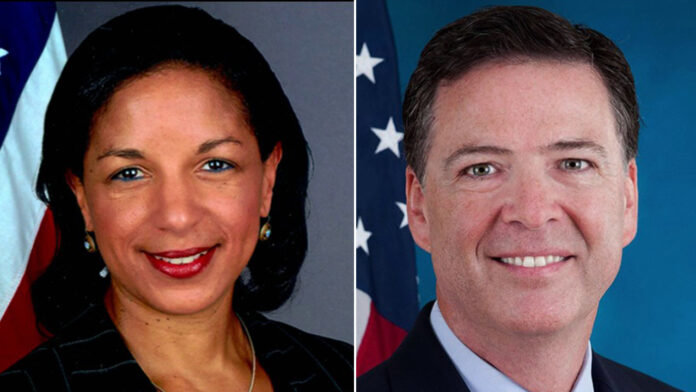A newly declassified email that former National Security Adviser Susan Rice sent herself on President Trump’s inauguration day has raised new questions about James Comey’s role in the outgoing Obama administration’s treatment of Michael Flynn — but the former FBI director has not yet publicly commented on the contents of the memo.
The email Rice sent to herself on Jan. 20, 2017, documented a Jan. 5 Oval Office meeting with former President Barack Obama and others, during which he provided guidance on how law enforcement should address Russian interference in the 2016 presidential race. Parts of it were released previously, but the section on Comey’s response had been classified as “TOP SECRET” until now.
Acting Director of National Intelligence Richard Grenell declassified the previously redacted section of Rice’s email and Sen. Ron Johnson, R-Wis., made it public on Tuesday.
That section says Comey suggested to Obama that the National Security Council [NSC] might not want to pass “sensitive information related to Russia” to incoming National Security Adviser Flynn.
The email pointed to what were apparently widespread concerns about Flynn’s Russa contacts. Multiple sources confirmed to Fox News that what initially put Flynn on the radar was the number of interactions he had with senior Russian government officials in 2016, as laid out in various intelligence reports viewed by Obama White House officials.
READ: DECLASSIFIED SUSAN RICE EMAIL ABOUT JAN. 5, 2017 OVAL OFFICE MEETING WITH OBAMA
Comey appeared to go a step further, however, in suggesting in that meeting that the administration might not want to share sensitive information with Flynn.
According to the email, Obama brought up that consideration, saying “he wants to be sure that, as we engage with the incoming team, we are mindful to ascertain if there is any reason that we cannot share information fully as it relates to Russia.”
Comey affirmed to Obama he was proceeding “by the book,” according to the note, and went on to discuss concerns about Flynn’s known conversations with Russia’s ambassador at the time — conversations that would play a role later in the criminal case against Flynn.
Rice wrote: “From a national security perspective, Comey said he does have some concerns that incoming NSA Flynn is speaking frequently with Russian Ambassador [Sergey] Kislyak. Comey said that could be an issue as it relates to sharing sensitive information. President Obama asked if Comey was saying that the NSC should not pass sensitive information related to Russia to Flynn.”
Rice then wrote, “Comey replied, ‘potentially.’ He added that he has no indication thus far that Flynn has passed classified information to Kislyak, but he noted that ‘the level of communication is unusual.’”
But on Tuesday, a spokeswoman for Rice indicated that despite Comey’s suggestion, others in the Obama administration did not necessarily proceed that way. She said Rice, for one, did not change the way she dealt with her successor.
BARR SAYS HE DOES NOT EXPECT CRIMINAL INVESTIGATION OF OBAMA OR BIDEN AS RESULT OF DURHAM PROBE
“The email makes clear that the Obama Administration did not change the way it briefed Michael Flynn—but rather that President Obama asked Director Comey ‘to inform him if anything changes in the next few weeks that should affect how we share classified information with the incoming team,’” Rice representative Erin Pelton said in a statement.
“In fact, Ambassador Rice briefed Michael Flynn for over 12 hours, on four separate occasions and led the National Security Council in preparing and delivering to him over 100 separate briefing memos,” Pelton continued. “Ambassador Rice did not alter the way she briefed Michael Flynn on Russia as a result of Director Comey’s response.”
Comey, who has been a frequent critic of President Trump and the Justice Department under his administration, has not said anything publicly on the topic of Rice’s email. Comey also did not immediately respond to Fox News’ request for comment.
Meanwhile, Republican lawmakers, like Johnson, are digging for more information on unmasking.
Late Tuesday, Johnson penned a letter to Grenell requesting “the declassification of additional information related to the unmasking of Americans around the time of the 2016 election, but also to expand the scope of our request to include information as early as January 2016.”
BRENNAN SAYS HE’S WILLING TO BE INTERVIEWED BY DURHAM, SAYS HE HAS ‘NOTHING TO HIDE’
“Based on our investigation and recent press reports, we are increasingly concerned that the surveillance of U.S. persons affiliated with the Trump campaign began earlier than the opening of the FBI’s Crossfire Hurricane investigation in late July 2016,” Johnson wrote.
Johnson’s letter to Grenell came after the acting DNI declassified a list of top Obama administration officials who purportedly requested to “unmask” the identity of Flynn during the presidential transition period.
The roster featured top-ranking figures, including Comey and Obama’s then-chief of staff Denis McDonough.
The documents are emerging in the wake of the Justice Department’s decision seeking to dismiss the case against Flynn, for lying to investigators about his contacts with Kislyak. Flynn had pleaded guilty, but later sought to withdraw the plea. The case remains before a federal judge, who is considering the DOJ motion.
Fox News’ Gillian Turner contributed to this report.






